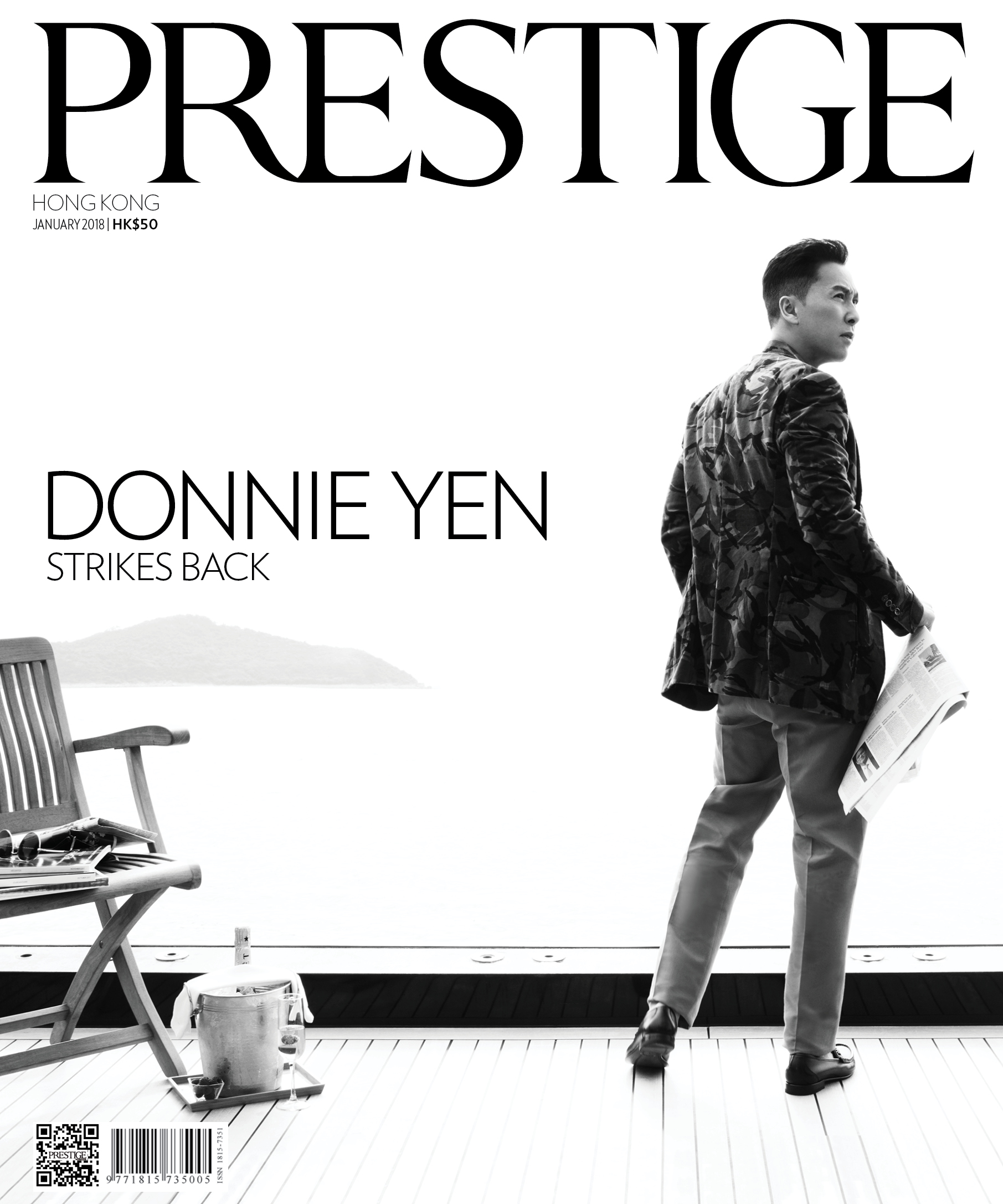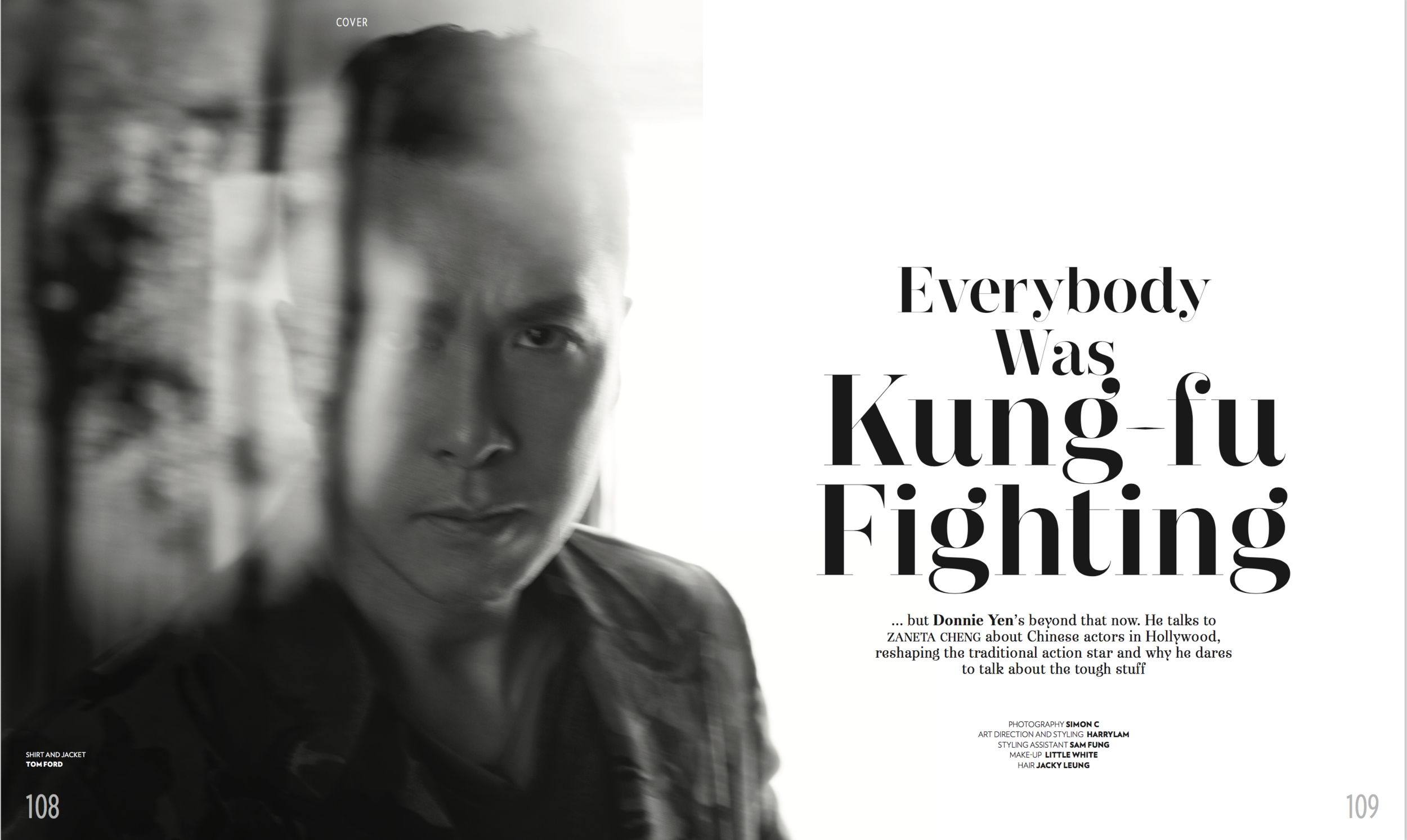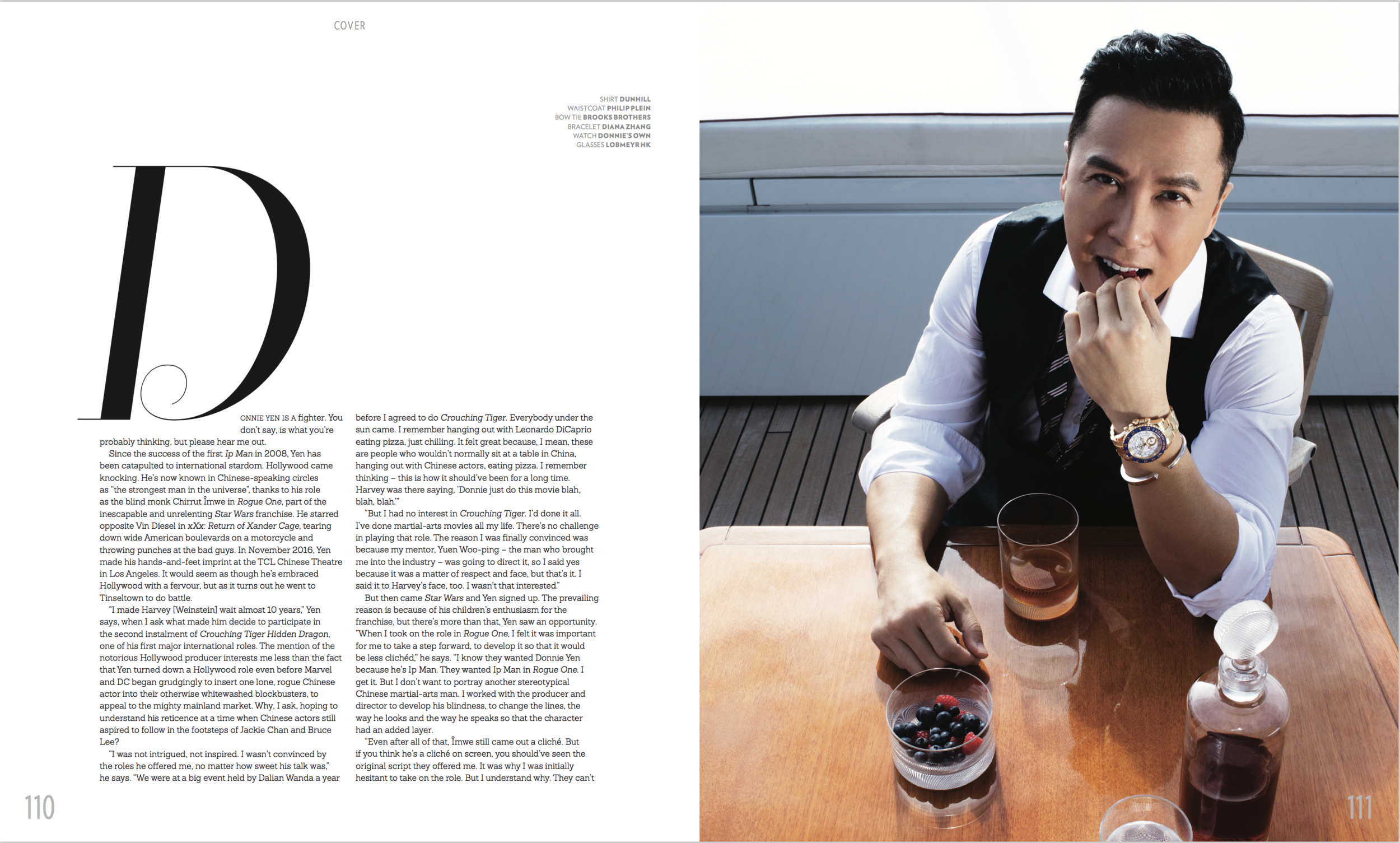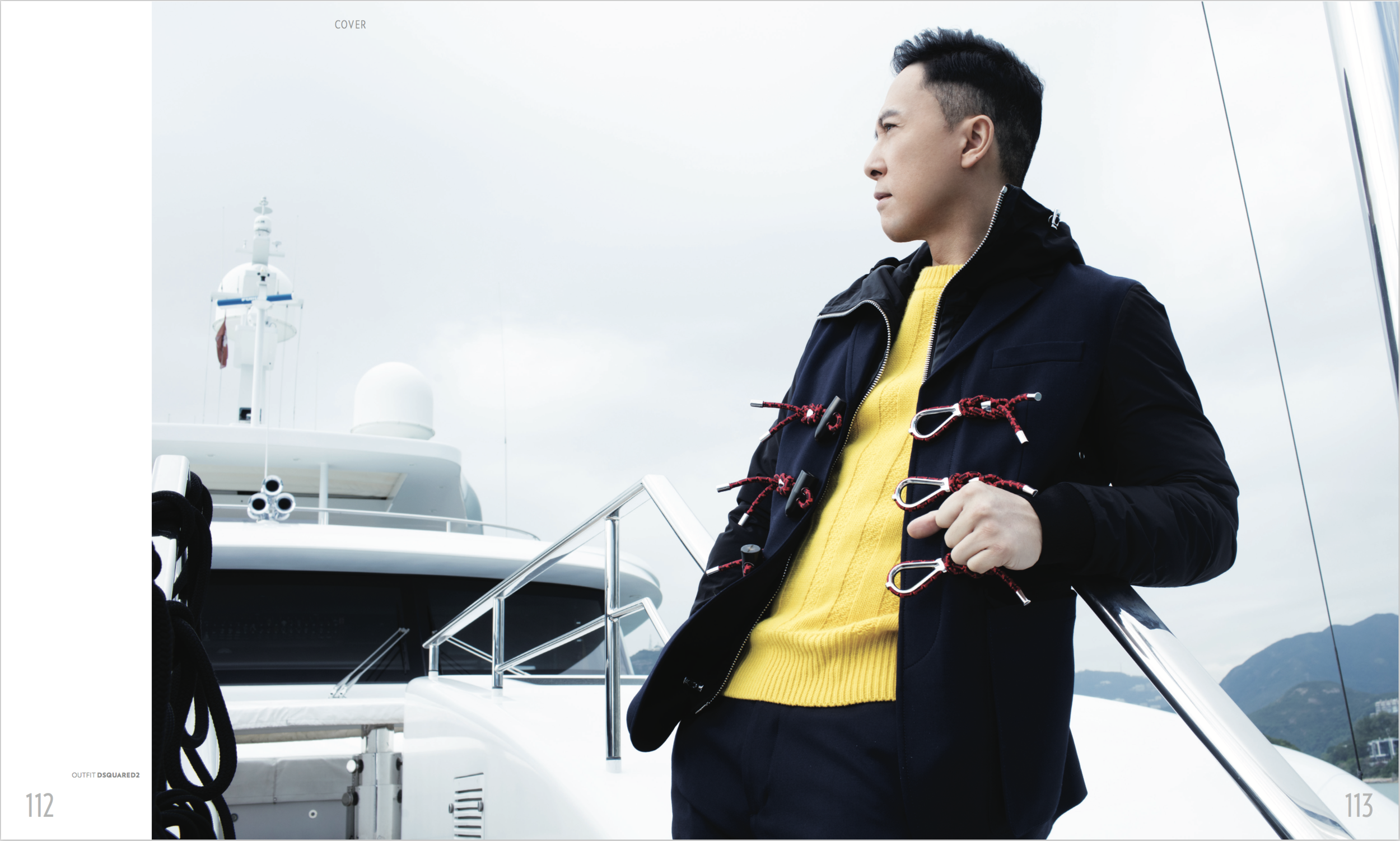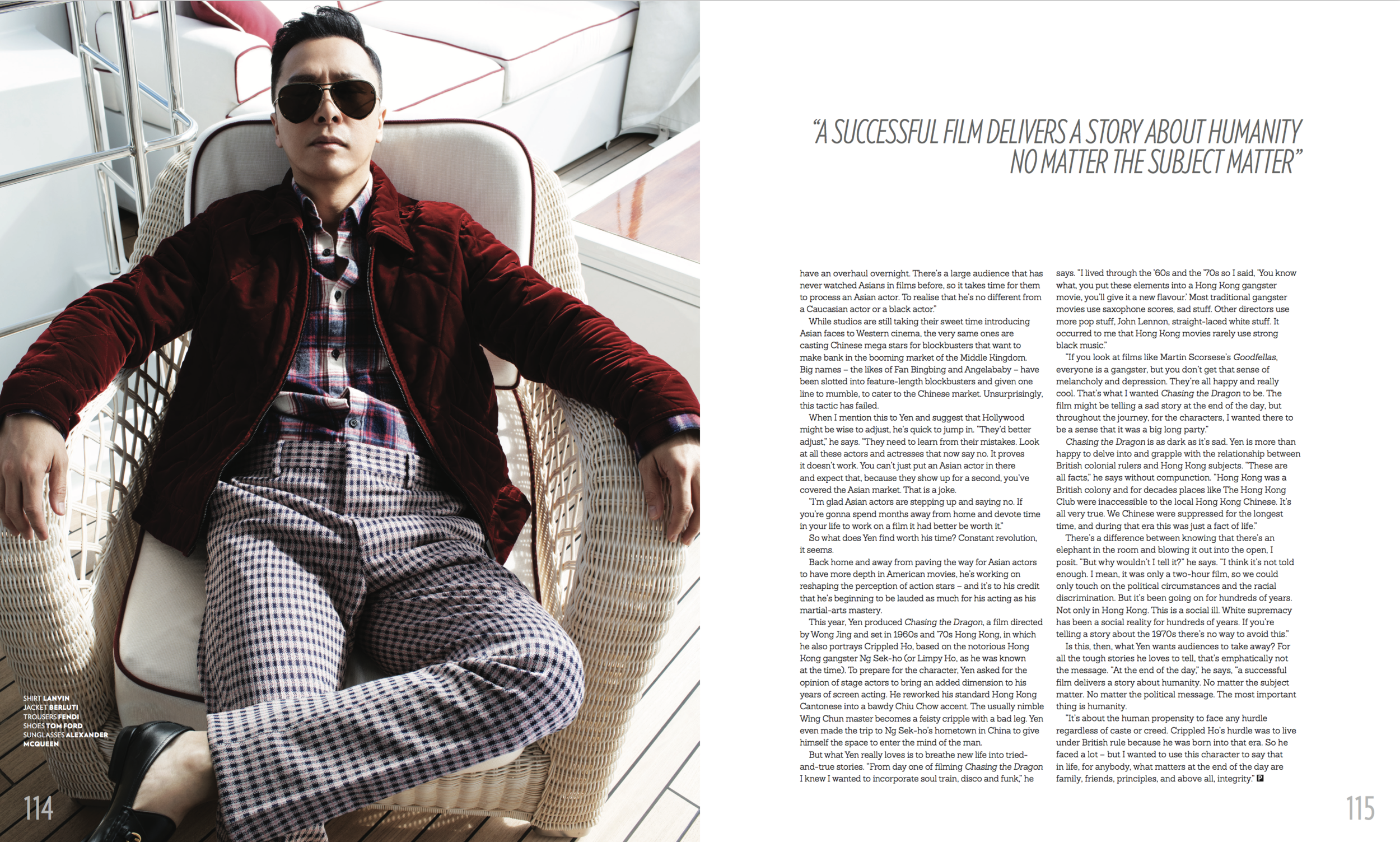Donnie Yen (COVER STORY) | Prestige Hong Kong (Jan 18)
Donnie Yen is a fighter. You don’t say, is what you’re probably thinking, but please hear me out.
Since the success of the first Ip Man in 2008, Yen has been catapulted to international stardom. Hollywood came knocking. He’s now known in Chinese-speaking circles as “the strongest man in the universe”, thanks to his role as the blind monk Chirrut Îmwe in Rogue One, part of the inescapable and unrelenting Star Wars franchise. He starred opposite Vin Diesel in xXx: Return of Xander Cage, tearing down wide American boulevards on a motorcycle and throwing punches at the bad guys. In November 2016, Yen made his hands-and-feet imprint at the TCL Chinese Theatre in Los Angeles. It would seem as though he’s embraced Hollywood with a fervour, but as it turns out he went to Tinseltown to do battle.
“I made Harvey [Weinstein] wait almost 10 years,” Yen says, when I ask what made him decide to participate in the second instalment of Crouching Tiger Hidden Dragon, one of his first major international roles. The mention of the notorious Hollywood producer interests me less than the fact that Yen turned down a Hollywood role even before Marvel and DC began grudgingly to insert one lone, rogue Chinese actor into their otherwise whitewashed blockbusters, to appeal to the mighty mainland market. Why, I ask, hoping to understand his reticence at a time when Chinese actors still aspired to follow in the footsteps of Jackie Chan and Bruce Lee?
“I was not intrigued, not inspired. I wasn’t convinced by the roles he offered me, no matter how sweet his talk was,” he says. “We were at a big event held by Dalian Wanda a year before I agreed to do Crouching Tiger. Everybody under the sun came. I remember hanging out with Leonardo DiCaprio eating pizza, just chilling. It felt great because, I mean, these are people who wouldn’t normally sit at a table in China, hanging out with Chinese actors, eating pizza. I remember thinking – this is how it should’ve been for a long time. Harvey was there saying, ‘Donnie just do this movie blah, blah, blah.’”
“But I had no interest in Crouching Tiger. I’d done it all. I’ve done martial-arts movies all my life. There’s no challenge in playing that role. The reason I was finally convinced was because my mentor, Yuen Woo-ping – the man who brought me into the industry – was going to direct it, so I said yes because it was a matter of respect and face, but that’s it. I said it to Harvey’s face, too. I wasn’t that interested.”
But then came Star Wars and Yen signed up. The prevailing reason is because of his children’s enthusiasm for the franchise, but there’s more than that, Yen saw an opportunity. “When I took on the role in Rogue One, I felt it was important for me to take a step forward, to develop it so that it would be less clichéd,” he says. “I know they wanted Donnie Yen because he’s Ip Man. They wanted Ip Man in Rogue One. I
get it. But I don’t want to portray another stereotypical Chinese martial-arts man. I worked with the producer and director to develop his blindness, to change the lines, the
way he looks and the way he speaks so that the character had an added layer.
“Even after all of that, Îmwe still came out a cliché. But if you think he’s a cliché on screen, you should’ve seen the original script they offered me. It was why I was initially hesitant to take on the role. But I understand why. They can’t have an overhaul overnight. There’s a large audience that has never watched Asians in films before, so it takes time for them to process an Asian actor. To realise that he’s no different from a Caucasian actor or a black actor.”
While studios are still taking their sweet time introducing Asian faces to Western cinema, the very same ones are casting Chinese mega stars for blockbusters that want to make bank in the booming market of the Middle Kingdom. Big names – the likes of Fan Bingbing and Angelababy – have been slotted into feature-length blockbusters and given one line to mumble, to cater to the Chinese market. Unsurprisingly, this tactic has failed.
When I mention this to Yen and suggest that Hollywood might be wise to adjust, he’s quick to jump in. “They’d better adjust,” he says. “They need to learn from their mistakes. Look at all these actors and actresses that now say no. It proves it doesn’t work. You can’t just put an Asian actor in there and expect that, because they show up for a second, you’ve covered the Asian market. That is a joke.
“I’m glad Asian actors are stepping up and saying no. If you’re gonna spend months away from home and devote time in your life to work on a film it had better be worth it.”
So what does Yen find worth his time? Constant revolution, it seems.
Back home and away from paving the way for Asian actors to have more depth in American movies, he’s working on reshaping the perception of action stars – and it’s to his credit that he’s beginning to be lauded as much for his acting as his martial-arts mastery.
This year, Yen produced Chasing the Dragon, a film directed by Wong Jing and set in 1960s and ’70s Hong Kong, in which he also portrays Crippled Ho, based on the notorious Hong Kong gangster Ng Sek-ho (or Limpy Ho, as he was known at the time). To prepare for the character, Yen asked for the opinion of stage actors to bring an added dimension to his years of screen acting. He reworked his standard Hong Kong Cantonese into a bawdy Chiu Chow accent. The usually nimble Wing Chun master becomes a feisty cripple with a bad leg. Yen even made the trip to Ng Sek-ho’s hometown in China to give himself the space to enter the mind of the man.
But what Yen really loves is to breathe new life into tried-and-true stories. “From day one of filming Chasing the Dragon I knew I wanted to incorporate soul train, disco and funk,” he says. “I lived through the ’60s and the ’70s so I said, ‘You know what, you put these elements into a Hong Kong gangster movie, you’ll give it a new flavour.’ Most traditional gangster movies use saxophone scores, sad stuff. Other directors use more pop stuff, John Lennon, straight-laced white stuff. It occurred to me that Hong Kong movies rarely use strong black music.”
“If you look at films like Martin Scorsese’s Goodfellas, everyone is a gangster, but you don’t get that sense of melancholy and depression. They’re all happy and really cool. That’s what I wanted Chasing the Dragon to be. The film might be telling a sad story at the end of the day, but throughout the journey, for the characters, I wanted there to be a sense that it was a big long party.”
Chasing the Dragon is as dark as it’s sad. Yen is more than happy to delve into and grapple with the relationship between British colonial rulers and Hong Kong subjects. “These are all facts,” he says without compunction. “Hong Kong was a British colony and for decades places like The Hong Kong Club were inaccessible to the local Hong Kong Chinese. It’s all very true. We Chinese were suppressed for the longest time, and during that era this was just a fact of life.”
There’s a difference between knowing that there’s an elephant in the room and blowing it out into the open, I posit. “But why wouldn’t I tell it?” he says. “I think it’s not told enough. I mean, it was only a two-hour film, so we could only touch on the political circumstances and the racial discrimination. But it’s been going on for hundreds of years. Not only in Hong Kong. This is a social ill. White supremacy has been a social reality for hundreds of years. If you’re telling a story about the 1970s there’s no way to avoid this.”
Is this, then, what Yen wants audiences to take away? For all the tough stories he loves to tell, that’s emphatically not the message. “At the end of the day,” he says, “a successful film delivers a story about humanity. No matter the subject matter. No matter the political message. The most important thing is humanity.
“It’s about the human propensity to face any hurdle regardless of caste or creed. Crippled Ho’s hurdle was to live under British rule because he was born into that era. So he faced a lot – but I wanted to use this character to say that in life, for anybody, what matters at the end of the day are family, friends, principles, and above all, integrity.”
